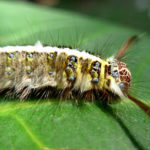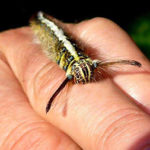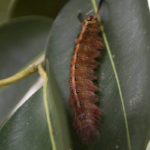Fiddler Crab (Uca tetragonon)

Image: Dave Hinchliffe
Observed: Koh Chang, 2016
Observed By:Dave Hinchliffe
A fiddler crab, sometimes known as a calling crab, may be any of approximately 100 species of semi-terrestrial marine crabs which make up the genus Uca. As members of the family Ocypodidae, fiddler crabs are most closely related to the ghost crabs of the genus Ocypode. This entire group is composed of small crabs – the largest being slightly over two inches across. Fiddler crabs are found along sea beaches and brackish inter-tidal mud flats, lagoons and swamps. Fiddler crabs are most well known for their sexually dimorphic claws; the males’ major claw is much larger than the minor claw while the females’ claws are both the same size.
…and seeing a bunch of them in mating season prancing around and jousting with each other like single males in a village disco is a very entertaining sight.
Fiddler Crab Wikipedia
Conocephalus melanus
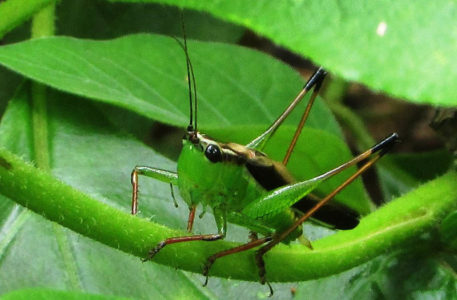
Image Copyright Paul Dunn
Observed: December 2016, Koh Chang
Observed By: Paul Dunn
Conocephalus melanus is a species of Tettigoniidae (bush-crickets or katydids) found in China, Japan, Nepal, India, Thailand, Singapore and Indonesia.
Conocephalus melanus
Orange Oakleaf (Kallima inachus)
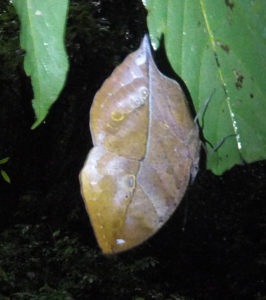
Image Copyright Paul Dunn
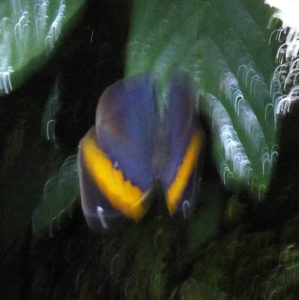
Image Copyright Paul Dunn
Last Observed: December 2016, Koh Chang
Observed By: Paul Dunn
Kallima inachus, the orange oakleaf or dead leaf, is a nymphalid butterfly found in tropical Asia from India to Japan. With wings closed, it closely resembles a dry leaf with dark veins and is a spectacular and commonly cited example of camouflage. It’s also a very rare case where the butterfly looks more interesting with its wings closed rather than open.
Orange Oakleaf at Wikipedia
Tropical Leatherleaf (Laevicaulis alte)
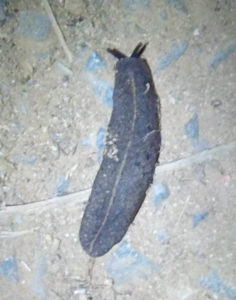
Image Copyright Paul Dunn
Observed: Koh Chang, December 2016
Observed By: Paul Dunn
Koh Chang Nature proudly announces… our first slug identification!!!
The Tropical Leatherleaf, Laevicaulis alte is a round, dark-coloured slug with no shell, 7 or 8 cm long. Its skin is slightly tuberculated. The central keel is beige in colour.
This slug has a unique, very narrow foot; juvenile specimens have a foot 1 mm wide and adult specimens have a foot that is only 4 or 5 mm wide.
The tentacles are small, 2 or 3 mm long, and they are only rarely extended beyond the edge of the mantle.
Tropical Leatherleaf Wikipedia
Great Owl Moth (Erebus macrocops)
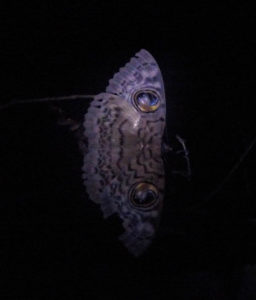
Image Copyright Paul Dunn
Last Observed: December 2016, Koh Chang
Observed By: Paul Dunn
Erebus macrops is a species of moth of the family Erebidae. It is found in the subtropical regions of Africa and Asia. It is a big old moth (the wingspan is about 12 cm) making it exceptionally large for an Erebidae species. The larvae feed on Acacia and Entada species.
Their most notable feature is a large eye-like circlular pattern on each wing.
Great Owl Moth at Wikipedia
Malayan Five Ring (Ypthima horsdieldii)
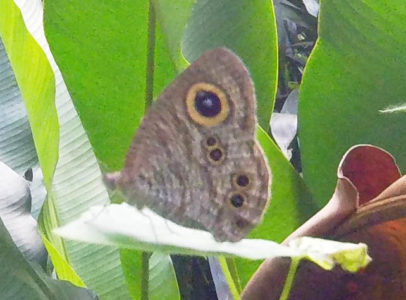
Image Copyright Paul Dunn
Last Observed: January 2016, Koh Chang
Observed By: Paul Dunn
This butterfly, named for the five circles on each wing is a native of peninsular Malaysia and Thailand.
Presumably the eye-like spots are used to confuse predators.
Malayan Five Ring at Butterfly Circle
Mimic Octopus (Thaumoctopus mimicus)
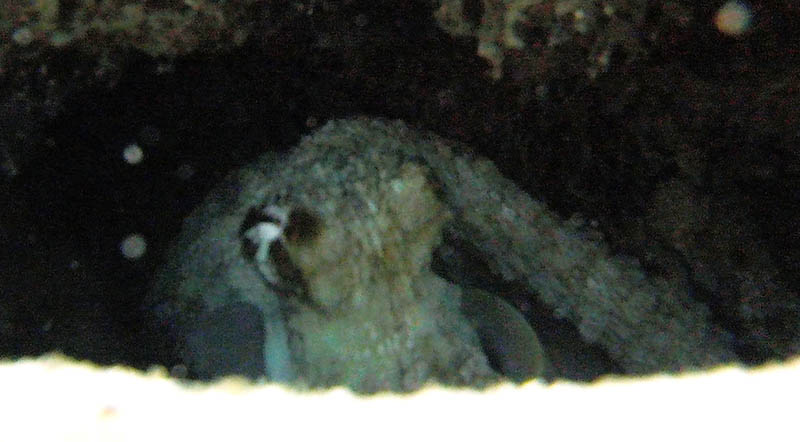
Image Copyright Paul Dunn
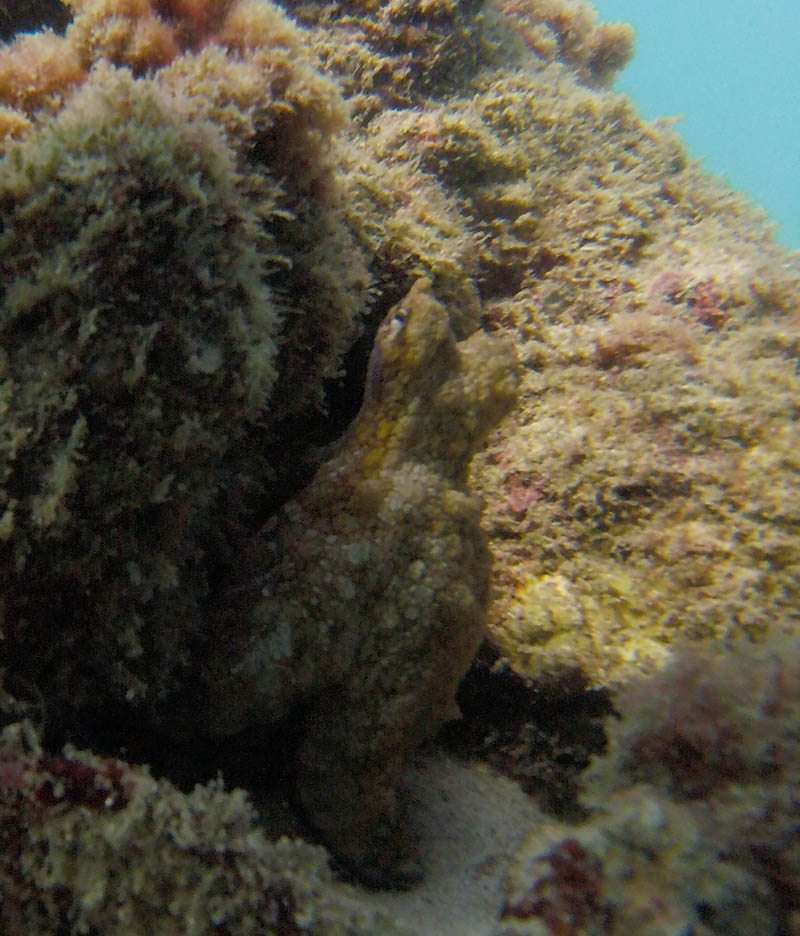
Image Copyright Paul Dunn
Observed: Koh Chang Reefs, October 2016
Observed By: Paul Dunn
The mimic octopus (Thaumoctopus mimicus) is an Indo-Pacific species of octopus capable of impersonating other local species. They are notable for being able to change their skin color and texture in order to blend in with their environment, such as algae-encrusted rock and nearby coral through pigment sacs known as chromatophores. The mimic octopus possesses chromatophores as well as the unique behaviour of taking shape of various objects and animals. The mimic octopus is the only currently known marine animal to be able to mimic such a wide variety of animals. Many animals can imitate a different species to avoid or intimidate predators, but the mimic octopus is the only one that can imitate as diverse a range of forms in order to elude predators.
So they are extremely cool creatures but very hard to photograph due to their astonishing abilities to disguise themselves. So the photos aren’t amazing but just be grateful to Paul Dunn for being able to photograph this elusive beast at all.
Mimic Octopus Wikipedia
Crimson-Tailed Marsh Hawk
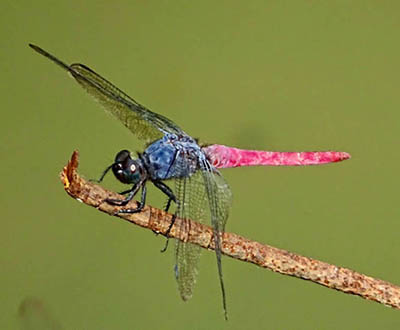
Image Copyright Gerardo Massere
Last Observed: April 2016, Koh Chang
Observed By: Gerardo Massere
The crimson-tailed marsh hawk, is a species of dragonfly in the family Libellulidae. It is a widespread species occurring from west India to Japan and south to Java and the Sunda Islands. It breeds in puddles, ponds and tanks. Three subspecies are recognized.A molecular phylogenetics study of Orthetrum dragonflies revealed that Orthetrum pruinosum is a cryptic species.
…and what’s a cryptic species? It’s a situation where there are two distinct species that have been previously classified under one species name. Trust me I can see why this happens – loads of these beasts look nearly the same.
Crimson-Tailed Marsh Hawk Wikipedia
Anomalorhiza Shawi
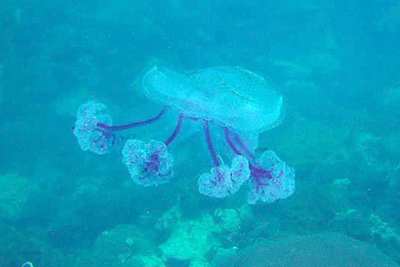
Image Copyright BB Divers
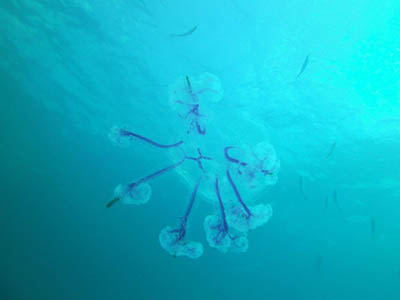
Image Copyright BB Divers
Last Observed: October 2014, Koh Chang
Observed By: BB Divers
This truly bizarre species of jellyfish is thought to be named after the shocked cry that you make when you step on one on the beach.
You won’t find much about it on the net, not sure whether that’s because little is known about it but its classification is recorded below.
Anomalorhiza Shawi Animal Diversity Web
…and here are some more nice pics of this oddly compelling beast.
Trabala Pallida
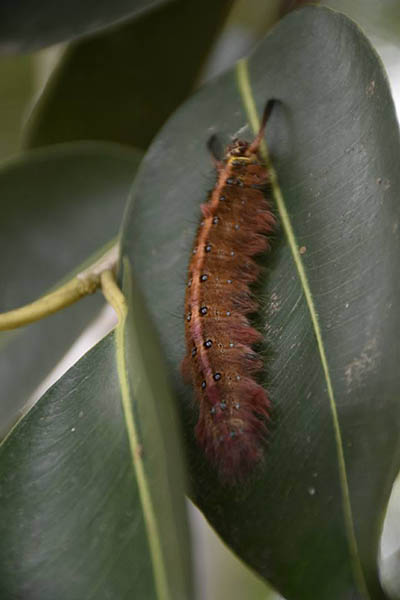
Image Copyright Heinz Koths
Last Observed: July 2016 – Koh Chang
Last Observed By: Heinz Koths
Trabala is a genus of moth in the family Lasiocampidae. The species are confined to China, throughout India, Sri Lanka, Myanmar and Java.
Trabala Wikipedia
Image Copyright Heinz Koths














